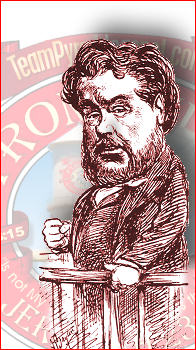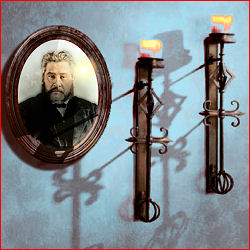This is one last (?) overdue bit from the Strange Fire Conference days.
 Todd Friel — who actually is, as it turns out, freakishly tall, even next to my > 6' — asked me what was characteristically an excellent question. I (equally characteristically) didn't have an excellent immediate answer. I murmured something, stammered, and said I'd get back to him. Within an hour, I had a much better answer... but I was never able to penetrate the coterie of adoring fans to chat Todd up again. So I promised I'd give it to him this way. And heeere we go.
Todd Friel — who actually is, as it turns out, freakishly tall, even next to my > 6' — asked me what was characteristically an excellent question. I (equally characteristically) didn't have an excellent immediate answer. I murmured something, stammered, and said I'd get back to him. Within an hour, I had a much better answer... but I was never able to penetrate the coterie of adoring fans to chat Todd up again. So I promised I'd give it to him this way. And heeere we go.Todd's question was about Michael Brown. To paraphrase, it's this: here's this professedly Christian brother who's well-studied in many ways, right on a number of issues... but we say he's dead-wrong when it comes to Charismaticism. So what do we do with him? How do we see him? False teacher, erring brother, what?
In response: first, I concur that Brown's very well-studied, better than many with whom I agree on a greater array of doctrinal areas. I've used Brown's set of books on objections to Jesus as Messiah with profit. Indeed I was stunned to find that someone as learned as Brown had identified himself with as troubled (and troubling) a denomination as AoG. Yet when I hear him speak, Brown pulls out Hebrew and Greek from memory — accurately, and accurately-pronounced — as very few popular speakers can do.
An aside: this is the downside of reading the Bible in Hebrew and Greek for ~40 years. It is painfully obvious when some well-known folks attempt a Hebrew or Greek word in a message — painfully obvious, I say, that they're just trying to approximate a transliteration they read in a commentary. It's what a Brit must feel when a Yank misuses a Britishism, or affects an appalling attempt at an English accent. When Brown whips out a Hebrew or Greek word or phrase, he nails it. It's evident that he's studied the original. That's very apparent, and it's very much to Brown's credit.
 So how to class Brown, given that he's thrown in with the wholly-wrongheaded movement, a schism responsible for some of the most harmful setbacks, distractions, and errors in Christian history?
So how to class Brown, given that he's thrown in with the wholly-wrongheaded movement, a schism responsible for some of the most harmful setbacks, distractions, and errors in Christian history?Here's my best attempt:
Suppose you have a sister you love dearly. Dear lady, good sister, many shared memories and values and loves. But then, as sometimes happens, she falls for this total loser of a jerk. Appalled, you try to talk to her; you reason and beg and plead. You even warn. But it seems like the more you reach out to her, the more tightly she wraps her arms around this odoriferous trainwreck of a man.
His name, of course, is Cary. You know, like Cary Grant? Only it's Cary S. Maddick. Yeah, sorry. Anyway.
Bad as that is, it gets even worse. You know for a fact that this Cary guy has a long and sordid past. There's airtight evidence of his collusion in a series of crimes and atrocities, though somehow he's managed to elude the authorities every time. What's worse, you find out that he can't be trusted around women, or even children. Given the opportunity, he'll work his way with them, corrupt them, and ruin them.
Now you find yourself living in a nightmare. You love your sister dearly; you're just sick with concern and regret for her bad choices. Your sister herself is welcome at your home any time, for any reason. But you've got kids, and you've got girlfriends who also come by to visit. If sister is there, Cary is there too. How could you in any way expose them to him?
So you tell your sister, "I love you. You can come any time you like. You're welcome here. But Cary is not, not ever, not under any circumstances. Don't bring him, and don't talk about him with those googly, swoony eyes you get. I don't want anyone I care about coming anywhere near Cary, or vice-versa. The man is poison."
"Oh come on," sis says. "You're blowing this way out of proportion. Cary's not that bad. He's grown. In fact, he's the best thing that ever happened to me. He's totally changed my life for the better. I'm liberated and happy, because of Cary. I think everyone should know him, and I want everyone to know him. If I come, he comes; if he goes, I go. I'm proud of him, and I'll tell the world. You can never part us."
Feel better? Has sister reassured you? Not so much?
So what do you do? As I say, it's a nightmare.
I think what you do is you love your sister, you pray for her, you long for her... but as long as (and to the degree that) she's twitterpated with this corrupt, pustulent, corrupting louse, she's going to have to stay away from anyone you care about, and you're going to have to warn everyone who knows her.
Make sense?
Now, I could massage this even further to get more service out of it. Suppose your sister is an excellent dance-instructor. People ask you if you'd recommend her. What do you say?
Well, on the one hand, there's no denying that she's really, really good at what she does. And you do love her.
But on the other hand, if they go hang around your sister, even if it's only for dance, they're going to meet Cary. Because she's made it clear: she's not apologetic about Cary, she's not embarrassed about Cary, she sees no harm in Cary. Perversely, she's proud of him...or so she insists, with significantly protesteth-too-much shrillness. She thinks he's the best thing since DVDs. Better. She wants everyone to know Cary. She'll use the dance-connection to bring out dear ol' Cary and introduce him around.
So, back to Brown and folks like him: yep, what he's good at, he's really good at... as he will tell you, over and over. This is despite Brown's lamentable charismaticism. But though often rebuked, Brown is stiffening his neck, and doubling down on what a powerful source for wonderfulness charismaticism is. If someone, with charitable motives, tries to say what I just said ("despite"), Brown will promptly correct that person. So we won't be looking for Brown to soft-pedal it.
Michael Brown may be a really good guy in many ways. But he's gotten tangled up with something that is a real nightmare, and he's doubling-down. I wish it weren't so; but ah, what a different world it would be if wishes were realities. The reality of the situation can't be shrugged off.
IN CONCLUSION: I don't know that this answer will make anyone happy. Giving it doesn't make me happy; having the situation doesn't make me happy.
But it is the best way I know how to yoke together three horses that want to pull in different directions: affection for a brother in Christ as such; appreciation for a brother's accomplishments; and necessary and appropriate horror and alarm over the harmful doctrine to which he insists on wedding himself.
SPECIAL NOTE TO FIRST-TIME COMMENTERS: since I have to keep deleting repeated attempts to comment off-topic from folks who apparently (A) haven't read the post, and (B) haven't read even the first comment, I lift two from the meta and put them here:
Commenters should note the premise/starting point of the post. It isn't, "What do we make of Charismaticism?" It is, rather, "Given that Charismaticism is a harmful error, what do we make of a beloved brother who very loudly and repeatedly insists on being identified with it?"And:
I continue to have to delete comments apparently responding to some other post, some post that begins "Hi! This is the first post this blog has ever done on continuationism! I wonder what to think of it. Would you please tell me?"
This is not that post.
Please, before commenting, READ THIS POST and at least the first comment. Then comment on it.You're welcome.





























